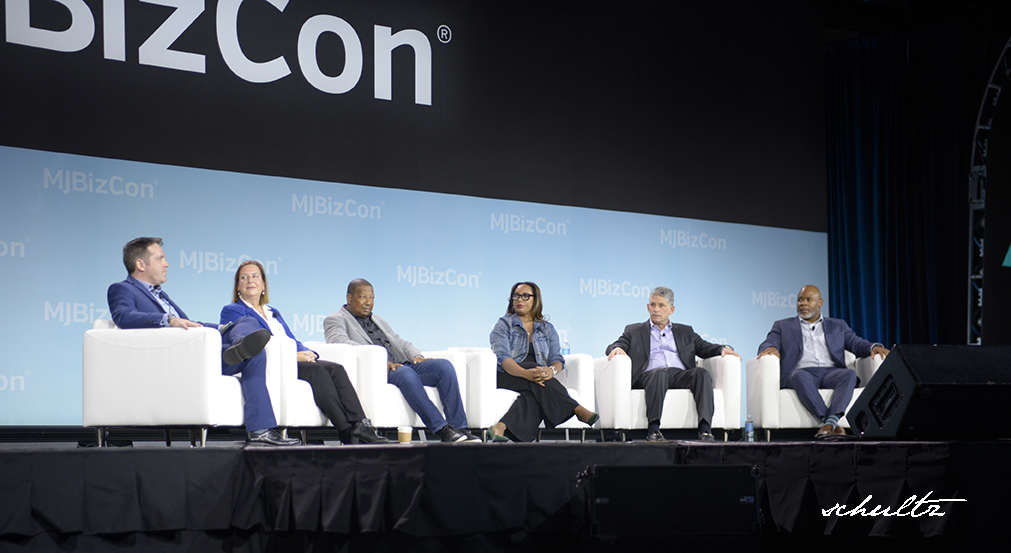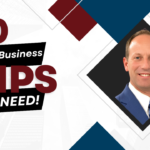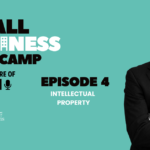Left to Right: Chris Walsh, CEO MJBiz; Nancy Whiteman, CEO/Co-Founder Wana Brands; Ruben Lindo, CEO/Co-Founder Blak Mar Farms; Toi Hutchinson, President/CEO Marijuana Policy Project; Peter Caldini, CEO Acreage Holdings; Troy Datcher, CEO The Parent Company.
It has been a year, to say the least, for cannabis business owners and operators throughout the country. As the industry continues to mature, businesses continue to experience challenges and all facets. There is no one-size-fits-all solution for businesses in regardless what space they are in. Last month, the MJBizCon hosted its 11th Annual Marijuana Business Conference and Expo in Las Vegas and day one on the main stage, some of the industry’s top CEO’s shared their insights and concerns about how the massive shift has impacted businesses on how they are navigating, structuring and surviving, both at the state and national level.
Heading up California’s top leading consumer brand portfolios and omnichannel cannabis platforms, CEO of The Parent Company, Troy Datcher addressed how strategic planning and maintaining organization infrastructure integrity has proven to be successful for them. “It really was about getting very clear on our strategic vision… we need to the best in class. We’re still developing and transforming our entire company.” Last year, the company faced the transition of merging three companies into one to form The Parent Company and became a publicly traded. Datcher stated earlier this year in an interview with financial firm, MGO, that “the challenging work to build internal systems and processes paid off because we set ourselves up for a successful integration. That foundation allowed us to make acquisitions to add to our direct-to-consumer platform with the additions of our Calma and Coastal dispensaries.” Further, Datcher pointed out the stark realities that operators are facing when it comes to keeping their doors open. Building something sustainable and good isn’t easy. If you are looking at capital and just going to focus on taking capital, you will take from your resources. How many times do we see organizations cut costs by taking from within?
For this company, a clear choice has been made to protect and invest in their employees, to protect their “war chest.” Datcher stated, “My main job is to attract the best talent in the industry and join us on the journey. It’s tough to do that if you can’t pay for the vision for the future, it’s tough to do in the event you don’t have cash in the bank to pay people good salary and compensation.” Companies need to assess not only their positioning in the market for great returns, but to examine themselves internally and determine if their infrastructure , if their “war chest,” is viable and sustainable for the long haul.
Acreage Holdings CEO, Peter Caldini stated that due to the industry slowdown in the last year, they were just like anyone else facing the pressures of aggressive market pricing and compression and increased competition. It becomes a matter of survival of the fittest. “In order to be successful, it really goes back to your business fundamentals. It’s your own good operational capabilities and creating differentiation.” Acreage made the adjustments they needed to in order have sustainable operations by scaling back their operational footprint and focusing on strategies that will ensure success in the competitive market. “I hate to say it, but anyone who is excited, now the real top performers are the ones that are going to succeed in the long run.”
With the influx of new players and the ever still strong presence of the illicit market occupying space, companies need to have a plan in place that will push them through these challenging times. Not only will these companies survive, but they will be stronger and better when they come out on the other side. Nancy Whiteman, CEO of Wana Brands, delved into the trickling effect of product saturation and lack of regulation of illicit operators. “We have competitors who are focused on top-line growth and they may not be making any money. They’re probably losing money, but it keeps the doors open.” This means for brands that are trying to be profitable and sustainable (dispensaries included), now will have to sell 30% more just to generate the same revenue and profit as before.
In California, cannabis is taxed four to five times before it hits the consumer and New York gets hit three times – state excise tax, local excise tax, and a potency tax which is based on the milligrams of total THC. Delta 8 products and other derivatives continue to make their way into the market that are being sold through the mail, at gas stations with no age restrictions. These products are made using toxic solvents, have no label or packaging restrictions, potency requirements, or undergo testing or taxation. “We went from a situation where there were zero delta 8 sales to $500 million in sales in 2022.” Toi Hutchinson, President and CEO of the Marijuana Policy Project brought reiterated the importance of public health and safety and the potential threats that could arise if things like this are not debated and regulated.
The 2018 Farm Bill has a five year mandatory review and Whiteman urged that this is the year to review it and when as an industry, we could be coming together with our lobbyists. No one will understand how serious this problem is if no one is willing to speak out about it. “When we want legalization, we kind of stop that process. We think we’ve arrived in the states and then we stop as manufacturers and producers. We stop doing the most important part of this job which is education,” said Ruben Lindo, CEO and Co-Founder of Blak Mar Farms. Lindo believes that educating consumers make for a sophisticated market. Regulation. Public safety. Protecting the industry… matters.
Education though isn’t only for consumers. Lindo stated, “Not all money is good money.” Blak Mar Farms was not built on investors but rather through strategically collaborating with partners within their network. “There’s no secret that black businesses are 75-85% underfunded compared to our white counterparts. It doesn’t mean we have less product and less branding. Doesn’t mean we are less intelligent or less motivated. We don’t have access to the information. If we don’t start educating ourselves on where this money is, we will not get it.” Equal opportunity doesn’t mean equal access. Lindo stressed when entreprenuers are seeking funding to be selective and aware of predatory lenders. To avoid these types of encounters, make sure the people working for you are qualified and trustworthy. Building relationships with lenders is one thing and understanding the discipline of finance is another.
The panel wrapped things up with sharing their overall enthusiasm and optimism about the future of the industry. Having the opportunity to make a difference in peoples’ lives with their products, developing technologies and processes, improving relationships with consumers through education and best practices, and seeing equity and inclusion within the industry actually take place, and regulatory improvement were some of the things everyone looks forward to for the year to come.





